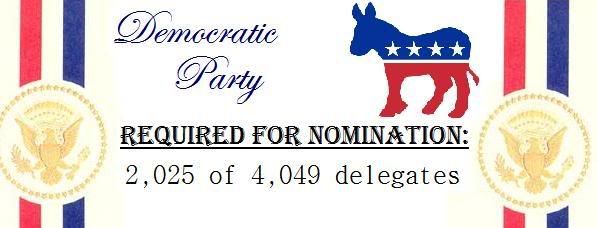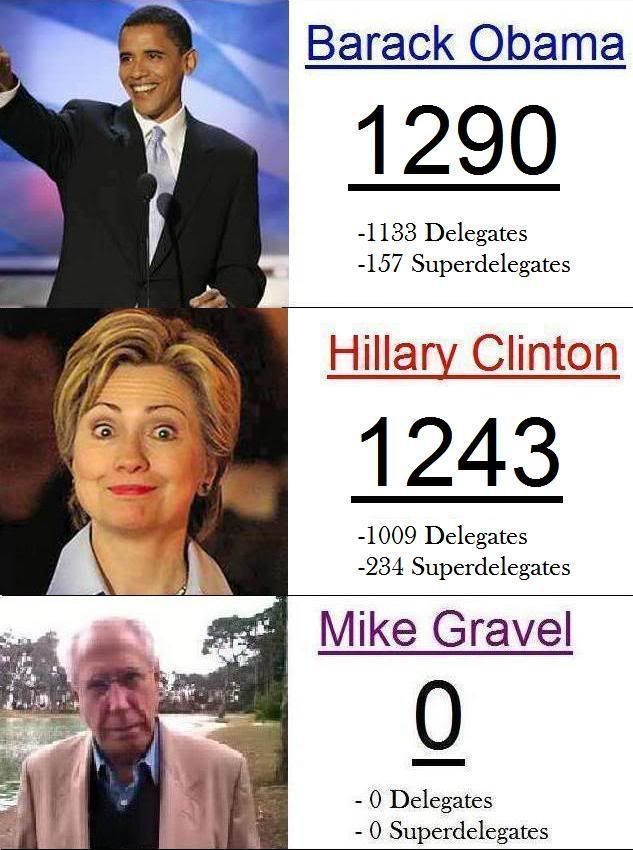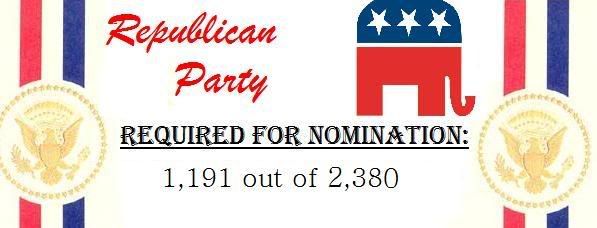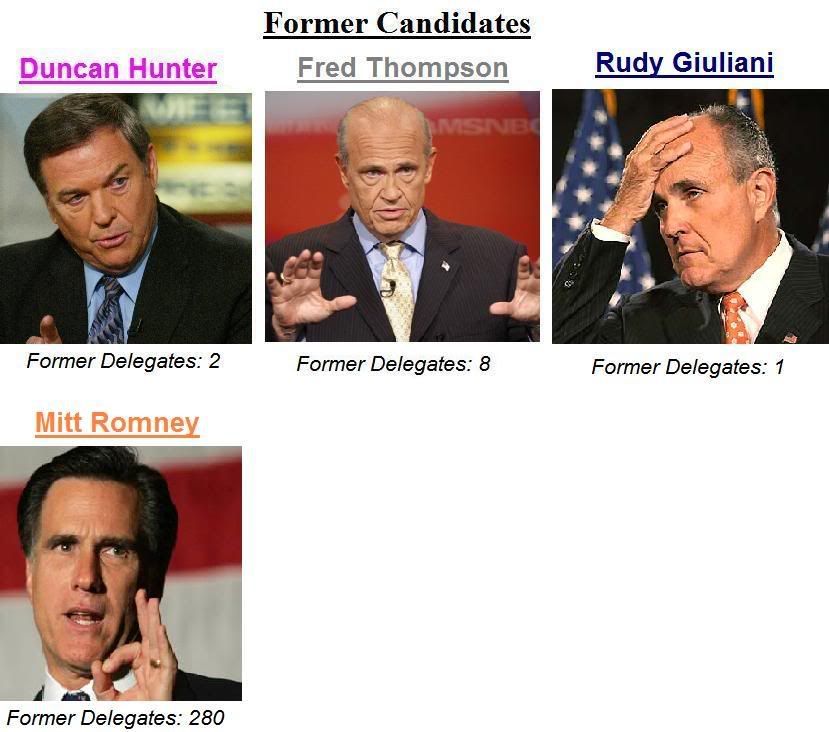grandjedi6
Master of the Google Search
Please Note: Due to upping their primary/caucus dates the Democratic National Committee has striped all delegates from Michigan and Florida. Likewise the Republican National Committee has removed half of the delegates from Florida, Michigan, South Carolina, Wyoming, and New Hampshire
Also, all delegate tallies for candidates use both pledged candidates and superdelegates/unpledged delegates. While the superdelegates/unpledged candidates are officially unpledged, some are still tallied as they have endorsed a candidate. Please keep in mind that all totals are estimated and could potentially change by the Republican and Democratic Conventions

Who are Superdelegates??
-Members of the Democratic National Committee
-The Current Democratic President and Vice-President (if applicable)
-All Democratic members of the United States House of Representatives and Senate
-All Democratic Governors
-All former Democratic Presidents, vice-Presidents, Leaders of the Senate, Speakers of the House, Minority Leaders and chairs of the DNC.
These 795 "superdelegates" are almost 16 percent of the 2,025 delegates (4,049 total) a candidate needs to secure the party's presidential nomination, while officially uncommitted and thus "unreplaceable", can publicly endorse a candidate, adding to his and her total.
Voters select delegates in primaries and caucuses through the country. Pledged delegates reflect the preferences of the voters, but are not actually legally bound to vote for the candidate they are pledged for. However, since candidates may remove delegates whom they feel may be disloyal, pledged delegates generally vote for the candidate they represent.




wikipedia said:The Republican National Committee allocates delegates to states and territories in four categories. Three district level delegates are given to states for each of their congressional districts. Ten additional at-large delegates are given to each state regardless of population. States earn additional bonus delegates for having U.S. Senators and governors from the Republican Party, sending a majority-Republican delegation to the U.S. House, maintaining partial or total Republican control of the state legislature, or casting a majority of their 2004 electoral vote for George W. Bush. Finally, each state automatically receives three party delegates: their two RNC delegates and the chairman of the state Republican party. Territories are only eligible to send at-large and party delegates.
Unlike the Democratic Party, which mandates a proportional representation system for delegate selection within a state, the Republican Party has no such restriction. For states with primaries, some states choose to use the "winner-take-all" method to award delegates within a state, while others do winner-take-all within a congressional district, and still others use the proportional process. Unlike the Democratic Party, where pledged delegates support the candidate whom they are pledged, state party by-laws determine whether each delegate is pledged and for how many ballots.
In caucus states, most state parties use a two pronged process. A straw poll, often called a presidential preference poll, is conducted of the attendees at the caucus. The results are released to the media and published on the state party website. Delegates are then elected to the county conventions. It is at the county conventions that delegates are elected to state conventions, and from the state convention to the national convention. At each level, delegates may be bound or unbound to a candidate. If unbound, delegates are not obligated to follow the results of the presidential preference poll. Thus, all estimates of delegates from caucus states are dependent on state law.
Unlike in the Democratic Party, Republican members of Congress (including Senate members, House members, and non-voting delegates), and state governors are not automatically made delegates to the party's national convention, however their endorsements can hold sway on voters in caucuses and primaries.
Each state's two members of the Republican National Committee, and the party chairs of each state and territory are the only automatic delegates to the party's national convention. These superdelegates while officially uncommitted, may also publicly endorse a candidate.


Completed Primaries/Caucuses
Note: * = results not final
January 3
Iowa Caucus (Democrats -- 45 Delegates, Republicans -- 37 Delegates)
--- Obama: 16
--- Clinton: 15
--- Edwards: 14
--- Huckabee: 17
--- Romney: 12
--- Thompson: 3
--- McCain: 3
--- Paul: 2
January 5
Wyoming Caucus (Republican only) (Republicans -- 12 delegates)
--- Romney: 8
--- Thompson: 3
--- Hunter: 1
January 8
New Hampshire Primary (Democrats -- 22 Delegates, Republicans -- 12 Delegates)
--- Clinton: 9
--- Obama: 9
--- Edwards: 4
--- McCain: 7
--- Romney: 4
--- Huckabee: 1
January 15
Michigan Primary (Democrats -- 0 delegates, Republicans -- 30 delegates)
--- Romney: 18
--- McCain: 9
--- Huckabee: 3
January 19
Nevada Caucus (Democrats -- 25 delegates, Republicans -- 31 delegates)
--- Obama: 13
--- Clinton: 12
--- Romney: 17
--- Paul: 4
--- McCain: 4
--- Huckabee: 2
--- Thompson: 2
--- Giuliani: 1
--- Hunter: 1
South Carolina Primary [Republicans only] (Republicans -- 24 delegates)
--- McCain: 19
--- Huckabee: 5
January 26
South Carolina Primary [Democrats only] (Democrats -- 45 delegates)
--- Obama: 25
--- Clinton: 12
--- Edwards: 8
January 29
Florida Primary (Democrats -- 0 delegates, Republicans -- 57 delegates)
--- McCain: 57
February 1-3
Maine Caucus [Republicans only] (Republicans -- 18 delegates)
--- Romney: 10
--- McCain: 4
--- Paul: 3
--- Huckabee: 1
February 5th -- Super Tuesday
February 5
Alabama Primary (Democrats -- 52 delegates, Republicans -- 45 delegates)
--- Obama: 27
--- Clinton: 25
--- Huckabee: 26
--- McCain: 19
Alaska Caucus (Democrats -- 13 delegates, Republicans -- 26 delegates)
--- Obama: 9
--- Clinton: 4
--- Romney: 12
--- Huckabee: 6
--- Paul: 5
--- McCain: 3
American Samoa Caucus [Democrats only] (Democrats -- 3 delegates, Republicans -- 9 delegates)
--- Clinton: 2
--- Obama: 1
Arizona Primary (Democrats -- 56 delegates, Republicans -- 50 delegates)
--- Clinton: 31
--- Obama: 25
---McCain: 50
Arkansas Primary (Democrats -- 35 delegates, Republicans -- 31 delegates)
--- Clinton: 27
--- Obama: 8
--- Huckabee: 29
--- McCain: 1
--- Romney: 1
California Primary (Democrats -- 370 delegates, Republicans -- 170 delegates)
--- Clinton: 207
--- Obama: 163
--- McCain: 158
--- Romney: 12
Colorado Caucus (Democrats -- 55 delegates, Republicans -- 43 delegates) *
--- Obama: 33
--- Clinton: 13
--- Romney: 43
Connecticut Primary (Democrats -- 48 delegates, Republicans -- 27 delegates)
--- Obama: 26
--- Clinton: 22
--- McCain: 27
Delaware Primary (Democrats -- 15 delegates, Republicans -- 18 delegates)
--- Obama: 9
--- Clinton: 6
--- McCain: 18
Georgia Primary (Democrats -- 87 delegates, Republicans -- 72 delegates) *
--- Obama: 59
--- Clinton: 26
--- Huckabee: 48
--- McCain: 9
--- Romney: 3
Idaho Caucus [Democrats only] (Democrats -- 18 delegates)
--- Obama: 15
--- Clinton: 3
Illinois Primary (Democrats -- 153 delegates, Republicans -- 57 delegates)
--- Obama: 104
--- Clinton: 49
--- McCain: 54
--- Romney: 3
Kanasas Caucus [Democrats only] (Democrats -- 32 delegates)
--- Obama: 23
--- Clinton: 9
Massachusetts Primary (Democrats -- 93 delegates, Republicans -- 40 delegates)
--- Clinton: 55
--- Obama: 38
--- Romney: 22
--- McCain: 18
Minnesota Caucus (Democrats -- 72 delegates, Republicans -- 38 delegates)
--- Obama: 48
--- Clinton: 24
--- Romney: 38
Missouri Primary (Democrats -- 72 delegates, Republicans -- 58 delegates)
--- Obama: 36
--- Clinton: 36
--- McCain: 58
Montana Primary [Republican only] (Republicans -- 25 delegates)
--- Romney: 25
New Jersey Primary (Democrats -- 107 delegates, Republicans -- 52 delegates)
--- Clinton: 59
--- Obama: 48
--- McCain: 52
New Mexico Primary [Democrats only] (Democrats -- 26 delegates)
--- Clinton: 13
--- Obama: 12
New York Primary (Democrats -- 232 delegates, Republicans -- 101 delegates)
--- Clinton: 139
--- Obama: 93
--- McCain: 101
North Dakota Caucus (Democrats -- 13 delegates, Republicans -- 23 delegates)
--- Obama: 8
--- Clinton: 5
--- Romney: 8
--- McCain: 5
--- Huckabee: 5
--- Paul: 5
Oklahoma Primary (Democrats -- 38 delegates, Republicans -- 38 delegates)
--- Clinton: 24
--- Obama: 14
--- McCain: 32
--- Huckabee: 6
Tennessee Primary (Democrats -- 68 delegates, Republicans -- 52 delegates) *
--- Clinton: 40
--- Obama: 28
--- Huckabee: 23
--- McCain: 15
--- Romney: 8
Utah Primary (Democrats -- 23 delegates, Republicans -- 36 delegates)
--- Obama: 14
--- Clinton: 9
--- Romney: 36
West Virginia Caucus [Republicans only] (Republicans -- 18 delegates)
--- Huckabee: 18
February 9
Kansas Caucus [Republican only] (Republicans -- 36 delegates)
--- Huckabee: 36
Louisiana Primary (Democrats -- 56 delegates, Republicans -- 44 delegates)
- Since no candidate recieved over 50% of the statewide vote, no Republican candidate will be allocated delegates yet.
--- Obama: 34
--- Clinton: 22
Nebraska Caucus [Democrats only] (Democrats -- 24 delegates)
--- Obama: 16
--- Clinton: 8
Virgin Islands Convention [Democrats only] (Democrats -- 3 delegates)
--- Obama: 3
Washington Caucus (Democrats -- 78 delegates, Republicans -- 18 delegates) *
--- Obama: 52
--- Clinton: 26
February 10
Maine Caucus [Democrats only] (Democrats -- 24 delegates)
--- Obama: 15
--- Clinton: 9
February 12
District of Columbia Primary (Democrats -- 15 delegates, Republicans -- 16 delegates)
--- Obama: 12
--- Clinton: 3
---McCain: 16
Maryland Primary (Democrats -- 70 delegates, Republicans -- 34 delegates)
--- Obama: 43
--- Clinton: 27
--- McCain: 34
Virginia Primary (Democrats -- 83 delegates, Republicans -- 60 delegates)
--- Obama: 54
--- Clinton: 29
--- McCain: 60
Upcoming Primaries/Caucuses
February 5 - February 12
Democrats Abroad Primary [Democrats only] (Democrats -- 7 delegates)
February 16
Guam Caucus [Republican only] (Republicans -- 6 delegates)
February 19
Hawaii Caucus [Democrats only] (Democrats -- 20 delegates)
Washington Primary (Democrats -- n/a, Republicans -- 19 delegates)
Wisconsin Primary (Democrats -- 74 delegates, Republicans -- 37 delegates)
References said:All information has been compiled from a variety of sources including CNN, AP, the Democratic Convention Watch , The Green Papers and various websites of the DNC & RNC
